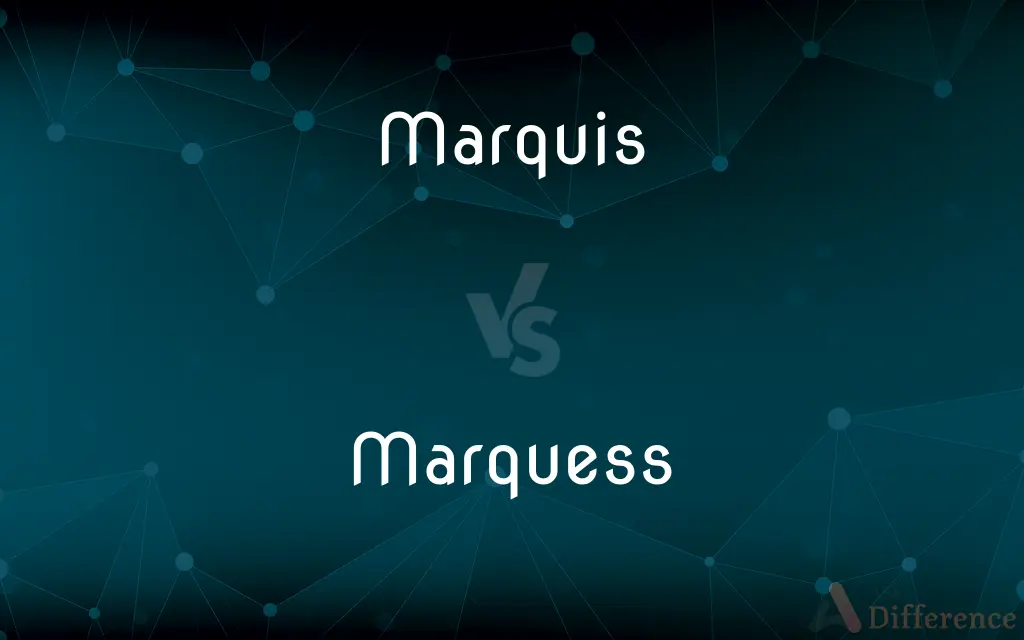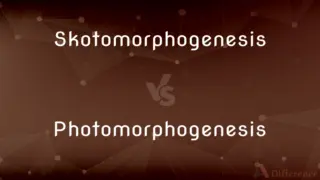Marquis vs. Marquess — What's the Difference?
Edited by Tayyaba Rehman — By Maham Liaqat — Updated on April 7, 2024
Marquis is a noble title in various European countries, while Marquess is its British equivalent, both ranking between a duke and an earl/count.

Difference Between Marquis and Marquess
Table of Contents
ADVERTISEMENT
Key Differences
Marquis is a title used in France, Italy, Spain, and other European countries to denote a noble rank. This title historically signified a ruler of a border territory or march, tasked with defending the frontier. On the other hand, Marquess is the English version of the same rank, used within the British peerage system. The roles and significance of both titles have evolved over time, but they originally shared the responsibility of protecting borders and maintaining the realm's security.
In terms of precedence in the noble hierarchy, both marquis and marquess hold a position that is higher than an earl or count but lower than a duke. This ranking is consistent across countries that use these titles. The distinction between the two terms is primarily linguistic and geographical, reflecting the use in different monarchic and noble traditions.
The etymology of both titles is similar, stemming from the Old French word "marquis," which itself comes from the Medieval Latin "marchio," meaning a ruler of a border area. The difference in spelling and pronunciation between marquis and marquess reflects the adaptation of the title to English phonetics and spelling conventions.
While the title of marquis is used in a variety of European languages and countries, each with its own variations and traditions, marquess is specifically tied to the British peerage system. This has implications for the title's use, traditions, and even the way titles are inherited or bestowed in different countries.
Despite these differences, the roles associated with these titles have largely become ceremonial in modern times, with marquises and marquesses typically involved in social, charitable, and cultural activities rather than military or governmental functions. The significance of these titles now lies more in heritage and social status than in practical responsibilities.
ADVERTISEMENT
Comparison Chart
Origin
France, Italy, Spain, etc.
Britain
Rank
Between duke and earl/count
Between duke and earl/count
Historical Role
Defending border territories
Defending border territories
Linguistic Origin
Old French "marquis"
Adapted to English from "marquis"
Modern Role
Ceremonial, social activities
Ceremonial, social activities
Compare with Definitions
Marquis
Ceremonial Role.
Today, the marquis is often involved in charitable activities.
Marquess
British Peerage.
The Marquess of Salisbury was a prime minister of the UK.
Marquis
European Title.
The Marquis de Lafayette is renowned for his role in the American Revolutionary War.
Marquess
Noble Hierarchy.
Ranking above an earl, the marquess has a distinguished place in British nobility.
Marquis
Noble Rank.
The Marquis of Montrose played a significant role in Scottish history.
Marquess
Social Status.
In modern times, the marquess is known for his philanthropic efforts.
Marquis
Border Territory Ruler.
As a marquis, his ancestors defended the frontier against invasions.
Marquess
Inheritance of Title.
The marquessate is often hereditary, passing from one generation to the next.
Marquis
Hereditary Title.
The title of marquis has been passed down in his family for generations.
Marquess
Defender of the Realm.
Historically, a marquess would protect the borders of the kingdom.
Marquis
A nobleman in England, France, and Germany, of a rank next below that of duke, but above a count. Originally, the marquis was an officer whose duty was to guard the marches or frontiers of the kingdom. The office has ceased, and the name is now a mere title conferred by letters patent or letters close.
Marquess
A British nobleman ranking below a duke and above an earl or a count.
Marquis
A nobleman ranking below a duke and above an earl or a count.
Marquess
A marquess (UK: ; French: marquis [maʁki]) is a nobleman of high hereditary rank in various European peerages and in those of some of their former colonies. The German language equivalent is Markgraf (Margrave).
Marquis
Used as a title for such a nobleman.
Marquess
Used as a title for such a nobleman.
Marquis
Pl. mar·quis·es (-kwĭ-sĭz) (märkwĭs) Variant of marquess.
Marquess
A title of nobility for a man ranking beneath a duke and above an earl.
Marquis
Any of various nymphalid butterflies of the Asian genus Bassarona (or Euthalia).
Marquess
(obsolete) A marchioness.
Anne Boleyn was created w:Marquess of Pembroke in 1532
Marquis
A nobleman in England, France, and Germany, of a rank next below that of duke. Originally, the marquis was an officer whose duty was to guard the marches or frontiers of the kingdom. The office has ceased, and the name is now a mere title conferred by patent.
Marquess
A marquis.
Marquis
Humorist who wrote about the imaginary life of cockroaches (1878-1937)
Marquess
Nobleman (in various countries) ranking above a count
Marquis
Nobleman (in various countries) ranking above a count
Marquess
A British peer ranking below a duke and above an earl
Common Curiosities
Are there still marquises and marquesses today?
Yes, these titles still exist, though their roles are more ceremonial and social than political or military.
How is a marquess different from a duke or earl?
A marquess ranks below a duke and above an earl, with the distinctions primarily based on historical duties and landholdings.
Can a woman hold the title of marquis or marquess?
Yes, the female equivalent is "marchioness," though the title's inheritance and bestowal can vary by country.
What is the main difference between a marquis and a marquess?
The main difference is geographical: "marquis" is used in various European countries, while "marquess" is specific to Britain.
Do marquis and marquess have the same rank?
Yes, both titles rank between a duke and an earl/count in the noble hierarchy.
How is the title of marquis pronounced in different countries?
Pronunciation can vary, reflecting the linguistic traditions of each country.
Are marquis and marquess titles recognized globally?
While recognized, the significance and understanding of these titles can vary internationally.
What responsibilities did marquises and marquesses historically have?
They were originally tasked with defending border territories or marches.
What does the territory of a marquis or marquess look like today?
Modern titles often do not include actual governance of territory, with lands being more symbolic or historical.
How has the significance of these titles changed over time?
Their significance has shifted from practical military and governance roles to symbolic social status.
Is the title of marquis/marquess hereditary?
Typically, yes, these titles are hereditary within the families that hold them.
Can the title of marquis or marquess be purchased?
Historically, titles could sometimes be granted for services or purchased, but this practice has largely been discontinued.
What is the role of a marquis or marquess in modern society?
Today, their roles are largely ceremonial, involving participation in social, cultural, and charitable activities.
What cultural impact do marquises and marquesses have today?
They often influence cultural and social spheres through philanthropy and public appearances.
How does one become a marquis or marquess?
Titles are usually inherited, though they can occasionally be bestowed by a monarch for service.
Share Your Discovery

Previous Comparison
Skotomorphogenesis vs. Photomorphogenesis
Next Comparison
Feedbacks vs. FeedbackAuthor Spotlight
Written by
Maham LiaqatEdited by
Tayyaba RehmanTayyaba Rehman is a distinguished writer, currently serving as a primary contributor to askdifference.com. As a researcher in semantics and etymology, Tayyaba's passion for the complexity of languages and their distinctions has found a perfect home on the platform. Tayyaba delves into the intricacies of language, distinguishing between commonly confused words and phrases, thereby providing clarity for readers worldwide.















































